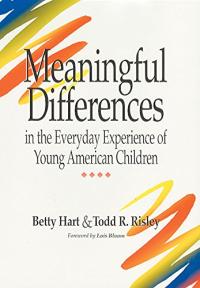Books by this author

Meaningful Differences in the Everyday Experience of Young American Children is the landmark research study that uncovered the widely cited “word gap” between children from low-income homes and their more economically advantaged peers. For 2-1/2 years, Haet and Risley recorded every word spoken at home between parent and child in 42 families, categorized as professional, working class, or welfare families. Between professional and welfare parents, there was a difference of almost 300 words spoken per hour. Extrapolating this verbal interaction to four years, a child in a professional family would accumulate experience with almost 45 million words, while an average child in a welfare family would hear just 13 million — coining the phrase “the 30 million word gap.” Hart and Risley’s follow-up studies at age 9 show that the large differences in children’s language experience were tightly linked to large differences in child outcomes. By giving children positive interactions and experiences with adults who take the time to teach vocabulary, oral language concepts, and emergent literacy concepts, children should have a better chance to succeed at school and in the workplace.
Meaningful Differences in the Everyday Experience of Young American Children

This companion to the award-winning Meaningful Differences in the Everyday Experience of Young American Children reveals how daily child-parent social interactions govern children’s language and social development. Based on data from 2-1/2 years of observing the everyday interactions of 1- and 2-year-old children learning to talk in their own homes, Hart and Risley have charted the month-by-month growth of the children’s vocabulary, utterances, and use of grammatical structures. The narrative highlights reliability-tested research findings and is supplemented with numerous transcripts from observations and a list of 2,000 words of children’s expressive vocabulary from 19-36 months of age.This book is must-reading for professionals in speech and language, child development, psychology, and education who need to understand how children come to talk as much and as well as their parents and caregivers.